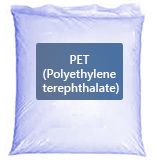
Company Information
Ask for more detail from the seller
Contact SupplierPET stands for Polyethylene Terephthalate Resin, a widely used thermo-plastic polymer. The fact that it belongs to the polyester family, lends it a common name of polyester when used for fabrics.
A positive point of PET Resin is that it is recyclable, and hence sustainable in nature. In fact, it can be re-recycled into a variety of forms, making it the most in-demand commodity for industrial and personal use.
Naturally, PET occurs as colourless resin with a somewhat crystalline form. When produced in a chemical setting, ethylene glycol and Teraphthalic acid react under high temperature and low pressure, forming long polymer chains which resemble spaghetti-like strands. These are then cut into pellets, which when heated will melt further and can be stretched into thin fibres or sheets. Another far more crystalline form of PET can also be prepared if it remains stretched at high temperatures for a longer period of time, giving it a more glass-like appearance.
There are different types of PET:
Apart from pure PET, co-polymers are also used to impart special properties to PET. For example, a commonly used coloured PET-G is produced by reacting cyclohexane di-methanol instead of ethylene glycol. PET-G can be easily extruded into a variety of shapes.

